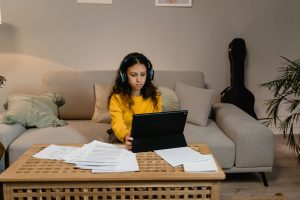
UK Online Primary Schools: Education’s Future
Due to technological advances, education has changed dramatically in recent years. Online learning is sweeping the UK. Online elementary schools offer a flexible and inclusive alternative to traditional brick-and-mortar classrooms. In this post, we’ll examine uk online primary school‘ pros, cons, and potential to change education.
- Flexible Thinking
Students benefit from online elementary schools’ flexibility. Individualised learning replaces set timetables and physical attendance. Students can study whenever and wherever they want. This flexibility is beneficial for children with special needs or those living in remote places who may have trouble attending typical schools.

- Individualised Learning
Personalised learning is emphasised in UK online primary schools. Adaptive learning tools and customised courses give students a personalised education. Online platforms use interactive tools, virtual classrooms, and multimedia materials to create an immersive learning experience. Students are more engaged and learn more with this personalised approach. - Improved Communication and Collaboration
Contrary to popular misconception, online learning does not equal isolation. Digital platforms promote collaborative learning in UK online primary schools. Teamwork and communication skills are developed through talks, group projects, and peer assessments. Online platforms also promote communication between students, instructors, and parents, creating a strong support network. Regular feedback and progress tracking keep parents informed and involved in their child’s education. - Security and Safety
In a digital world, protecting children online is crucial. Safeguarding is a priority in UK online primary schools. To ensure online safety, teachers are verified, platforms are secure, and content is age-appropriate. Online schools gain parents’ trust by addressing these concerns, giving them a realistic alternative for their children’s education. - Overcoming Challenges
Online primary schools have pros and cons. Bridge the student digital divide. Technology and the internet aren’t available to all kids, creating an educational gap. Online education is inclusive by providing equipment and connectivity to poor students. Online schools must also provide social engagement chances for students, as peer interaction is essential to holistic development. - Education’s Future
Online elementary schools in the UK are transforming education and could change the world. With technological advancements, online learning will incorporate immersive and interactive virtual reality (VR) and augmented reality (AR) experiences. Artificial intelligence (AI)-powered adaptive learning algorithms can recognise student weaknesses and customise the curriculum. Online schools also allow students to communicate with peers from different cultures, boosting cultural exchange and international collaboration.
UK online primary schools use technology to create flexible, personalised, and inclusive learning experiences. They expand students’ horizons by overcoming geographical limitations and meeting specific requirements. As education evolves, online institutions will shape the future of learning. UK online primary schools educate kids and prepare them for the digital world by embracing innovation, cooperation, and safeguarding.

With the rise of online learning as a viable and accessible alternative to traditional brick-and-mortar classrooms, the educational environment has changed dramatically. Several circumstances, notably the pandemic, have expedited the UK’s online learning shift. In this post, we’ll examine how UK students, educators, and institutions have adapted to online learning and its pros and cons.
- Access and Flexibility
Flexibility is a major benefit of online learning. Course materials, lectures, and assignments can be accessed at students’ leisure, allowing them to customise their learning schedules. This flexibility benefits students with part-time employment or family obligations. Online learning also removes geographical constraints, allowing students to take courses at distant universities. - Personalised Learning
Personalised education is possible in online learning systems. Students can connect with course information through interactive modules, multimedia materials, and adaptive learning tools. Online exams and feedback let teachers determine students’ needs and adapt their lessons. Students can learn at their own pace with this personalised approach. - Diverse Learning Materials
Students can use a wide range of materials to learn online. Academic databases, digital libraries, and multimedia material offer information beyond textbooks. Students can also share ideas and viewpoints on online learning platforms. Students’ critical thinking and horizons are expanded by this exposure to other viewpoints. - Learning Technology
In a digital world, IT skills are essential. Students gain technology skills by adapting to online learning. Digital literacy abilities, such as using learning management systems and collaboration and communication technologies, are vital in the 21st-century workplace. They become more digitally fluent by adapting to numerous platforms and tools.

- Overcoming Challenges
Online learning has many benefits, but it also has drawbacks. All students need dependable internet connectivity and compatible equipment. To enable equal access to online learning, the digital divide, which disproportionately impacts poor populations, must be crossed. Online students must manage their time and stay focused without the framework of a classroom, which demands self-discipline and determination. To help students overcome these hurdles, educators and institutions are crucial. - Education’s Future
Online learning is more than a crisis solution; it’s a glimpse into education’s future. As technology advances, online learning will combine VR, AR, and AI. Immersive learning environments and personalised learning pathways will result from these innovations. Online learning also promotes cultural interaction and global collaboration among students. - Self-Motivation and Time Management
Students build self-motivation through online learning. Without teachers and classmates, children must learn on their own. This needs goal-setting, time management, and self-motivation. Online learning fosters self-discipline and independence, which are useful in academic and professional situations. Students learn to prioritise, manage deadlines, and balance academic and other commitments, preparing them for higher education and professions. - Teaching Methods and Professional Growth
The student experience and teaching methods have changed due to online learning. To engage students online, educators are changing their methods. They’re trying new ways to convey content, use multimedia, and add interactivity to online lessons. Online teaching professional development is essential for educators to improve their skills and keep up with digital pedagogy. As online learning grows, educators need constant professional development to deliver high-quality digital education.
UK students, instructors, and institutions must adapt to online learning. Flexibility, personalised learning, diversified resources, and technical skill surpass initial adjustments. As online learning evolves, equal access to digital resources and support systems is crucial. Online learning is helping the UK create an inclusive, innovative educational system that prepares students for the digital age.







